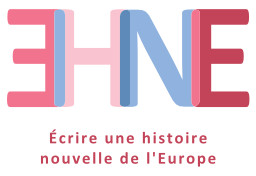LabEx EHNE

Reintegrating history into the European project and placing that project back within a general history means renewing the way we write European history itself. This view forms the basis for the project EHNE Écrire une nouvelle histoire de l’Europe (Writing a new history of Europe) which the Ministère de l’Enseignement supérieur et de la Recherche (Ministry of Higher Education and Research) approved in its statement of 14 February 2012, as one of 71 projects awarded in the second wave of calls for Laboratoires d’excellence(Research Centres of Excellence, LabEx) with the note ‘investments in the future’.
The principle aim of the EHNE project is to inform our understanding of the current crisis in Europe by constructing a new historiography of Europe that is addressed as much to the scholarly world as it is to the world of teachers, citizens and politicians.
Its ambition is to place the French schools of European history and international relations at the heart of the most essential historiographical and contemporary debates. The project, planned for eight years, brings together the competences of the most noted experts in France on its central questions, and connects to the strongest European and international networks. It is carried out in partnership between five research centres seated at three universities (Paris IV, Paris 1, Nantes).
Seven research strands have been created to meet these objectives. Each is managed from one of five principle research centres:
- European circulations: Europe as a product of material civilisation (UMR Roland Mousnier, Paris IV),
- Europe within a political epistemology (EA Centre de recherche en histoire du XIXe siècle, Paris I & Paris IV),
- European humanism or The construction of a Europe ‘from within’ between identity crisis and affirmation (UMR Roland Mousnier, Paris IV),
- Europe, Europeans and the World (EA CRHIA, Nantes),
- Europe of wars and marks of war (UMR Irice, Paris I & Paris IV),
- Gender and European identity (UMR Irice, Paris I & Paris IV),
- National traditions, circulations and identities in European art (UMR A. Chastel, École des Chartes).
These strands are united with the objective of producing a specific body of work in historical scholarship:
- A bilingual (French/English) analytical encyclopedia online, linked to an electronic journal and historic documents online (in their original languages),
- 28 books, 4 per research strand, including 2 in French and English editions,
- A final synthesis, in French and English editions, in the form of a collective volume,
- Workshops, study days and conferences in preparation for the publications.